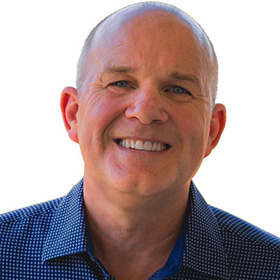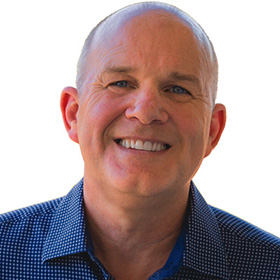 By Gary Thomas
By Gary Thomas
I became a Christian at a very young age. In truth, I can scarcely remember a moment when God was not an active and conscious presence in my life. Because of this, I felt drawn to Jesus early on.
I was drawn to more than Jesus, however; I also remember being drawn to girls. I had a pretty big crush on a dark-haired girl in kindergarten! The first time I actually held hands with a girl was in fifth grade. Tina and I rolled around the skating rink, both of us blushing as the Carpenters’ melodious harmonies described us well: “I’m On Top of the World.” It sure felt like it!
[Read the Bible Gateway Blog post, Sacred Marriage: An Interview with Gary Thomas]
As I grew older, both of these movements—toward Jesus and toward females—sometimes created an uneasy tension. The man I most admired, the one person on whom I wanted to model my life was a single man. As a big fan of the Christian classics—ancient books focused on building intimacy with God—I was fully aware of the long-standing tradition of celibacy—monks and nuns who lived out their dedication to God by pledging to abstain from marriage and sex. Because I knew their love for God was so intense, part of me wished I could embrace this; I wanted to be sold-out for Christ, and in college I struggled with the apostle Paul’s words, “It is good for a man not to marry” (1 Corinthians 7:1, as found in the 1984 edition of the NIV).
In fact, there is much in Christian history that has unofficially (and at times blatantly) considered married believers to be second-class Christians who compromised their integrity or were too weak to contain their sexual urges. Augustine thought he was being charitable when he wrote, referring to the intent to procreate, “Marital intercourse makes something good out of the evil of lust.” Scripture may be infallible, but Christian history isn’t, and unfounded prejudices do exist.
There’s no question that the “first pope,” Peter, was married. (Jesus couldn’t very well have healed Peter’s mother-in-law if Peter didn’t have a wife!) But there is also evidence in Scripture (1 Timothy 5:9 – 12) that during the first century young widows were already taking vows of celibacy. By AD 110, celibates could take vows that mirrored marital vows. This became a little more institutionalized so that by the third century, lifelong vows of celibacy were not uncommon. By the fourth century, such vows were commemorated by a full liturgical celebration.
It only takes a minute to create your own Bible Gateway free personal account and you’ll immediately upgrade your Bible Gateway experience. Do it right now!
Although Christianity was born out of Judaism, a religion in which marriage was considered a religious duty (one rabbi suggested that a man who does not marry is not fully a man), it wasn’t long until married believers were scarcely an afterthought during centuries of writing on spiritual theology (studying how Christian believers grow in their faith, learn to pray, and draw closer to God). Most of the Christian classics were written by monks and nuns for monks and nuns. The married could at best feebly try to simulate a single pursuit of God; the thought of pursuing God through marriage wasn’t really given serious consideration; instead, the emphasis was largely on pursuing God in spite of marriage.
I carried some of this baggage into my own relationship, but early on, my eyes were opened to a different reality. I remember my brother asking me a few questions about what marriage was like. I thought for a moment and said, “If you want to be free to serve Jesus, there’s no question — stay single. Marriage takes a lot of time. But if you want to become more like Jesus, I can’t imagine any better thing to do than to get married. Being married forces you to face some character issues you’d never have to face otherwise.” I had begun to realize I could further pursue God through marriage and not just in spite of it. Marriage didn’t need to hold me back from my spiritual goals; it could actually help me reach them.
Jesus, of course, was celibate his entire life, so it’s somewhat ironic to suggest that marriage is the preferred route to becoming more like him. But Jesus did live in a family, and, as Betsy Ricucci points out, that’s all he had done at the time the Father proclaimed, “This is my Son, whom I love; with him I am well pleased” (Matthew 3:17). “What had Jesus done to receive such praise? Nothing but live in his own home, honoring his parents and serving his father’s carpentry business. Apparently that was enough to please God.”
Family life is clearly not a compromise, and after you’ve been married for a while, you realize that the emphasis on celibacy is slightly overblown. All things considered, the sexual aspect takes up just a fraction of a married couple’s time. I was the first of my group of friends to get married, and I remember one of them asking me if it was still okay to just “drop in” unannounced.
“Oh, you better call first,” I said gravely, capturing his attention. “Married couples walk around naked all day long, you know.”
For a second, I almost had him!
The real transforming work of marriage is the 24-hours-a-day, 7-days-a-week commitment. This is the crucible that grinds and shapes us into the character of Jesus Christ. Instead of getting up at 3:00 a.m. to begin prayer in a monastery, the question becomes, “Who will wake up when the baby’s diaper needs changing?”
Marriage calls us to an entirely new and selfless life. This insight occurred to me some years ago when Lisa and the kids were traveling while I stayed home and worked. For the first time ever, it seemed, I had a free Saturday. For as long as I could remember, I had awakened each weekend and talked over with Lisa what the family would do; I almost didn’t know how to ask the question—what do I want to do? Yet that was the question I had asked myself as a single man virtually every Saturday before I was married.
Any situation that calls me to confront my selfishness has enormous spiritual value, and I slowly began to understand that the real purpose of marriage may not be happiness as much as it is holiness. Not that God has anything against happiness or that happiness and holiness are mutually exclusive, but looking at marriage through the lens of holiness began to put it into an entirely new perspective for me.
________
 Taken from Sacred Marriage: What If God Designed Marriage to Make Us Holy More Than to Make Us Happy? by Gary Thomas. Click here to learn more about this book and other resources by Gary Thomas.
Taken from Sacred Marriage: What If God Designed Marriage to Make Us Holy More Than to Make Us Happy? by Gary Thomas. Click here to learn more about this book and other resources by Gary Thomas.
What if God designed marriage to make you holy instead of happy? What if your relationship isn’t as much about you and your spouse as it is about you and God?
In Sacred Marriage, bestselling author Gary Thomas uncovers the ways that your marriage can become a doorway to a closer walk with God and with each other. Join over one million others who have already uncovered Thomas’s tips for fostering a sacred marriage.
Within the pages of Sacred Marriage, Thomas invites you to see how God can use your relationship with your spouse as a discipline and a motivation to love God more and reflect more of the character of his Son.
In addition to life-changing insights from Scripture, church history, and time-tested wisdom from Christian classics, you’ll find practical advice and techniques to make your marriage happier by becoming holier husbands and wives.
In Sacred Marriage, Thomas will give you all of the tools you need to:
- Turn marital struggles into spiritual and personal appreciation
- Love your spouse with a stronger sense of purpose
- Confront your weaknesses and sin in order to grow your relationship with God and with your spouse
- Partner in the spiritual growth and character formation of your spouse
- Transform a tired marriage into a relationship filled with awe and respect
Thomas reveals that sacred marriages teach us to love God and others well by fostering a healthy sex life, a strong prayer life, and a rich spiritual life. God uses our marriages to help us grow in character, in prayer, in worship, and in service—we just have to recognize that the purpose of marriage is holiness, not happiness.
Each copy also includes thought-provoking discussion questions designed to spark conversation between couples and small groups, allowing you to dive deeper into the lessons that Thomas shares in Sacred Marriage.
Join the one million others who have already started on their journey to transforming their relationship with their spouses and with their Creator.
Gary Thomas is a writer in residence at Second Baptist Church in Houston, Texas, and an adjunct faculty member teaching on spiritual formation at Western Seminary in Portland, Oregon, and Houston Theological Seminary in Houston, Texas. He is the author of nineteen books, including When to Walk Away, Sacred Pathways, Cherish, and Sacred Marriage—over one million copies sold. He has a master’s degree from Regent College and was awarded an honorary doctorate in divinity from Western Seminary. Gary has spoken in forty-nine states and ten different countries. Learn more at GaryThomas.com.
The post What If God Designed Marriage to Make Us Holy? appeared first on Bible Gateway Blog.










